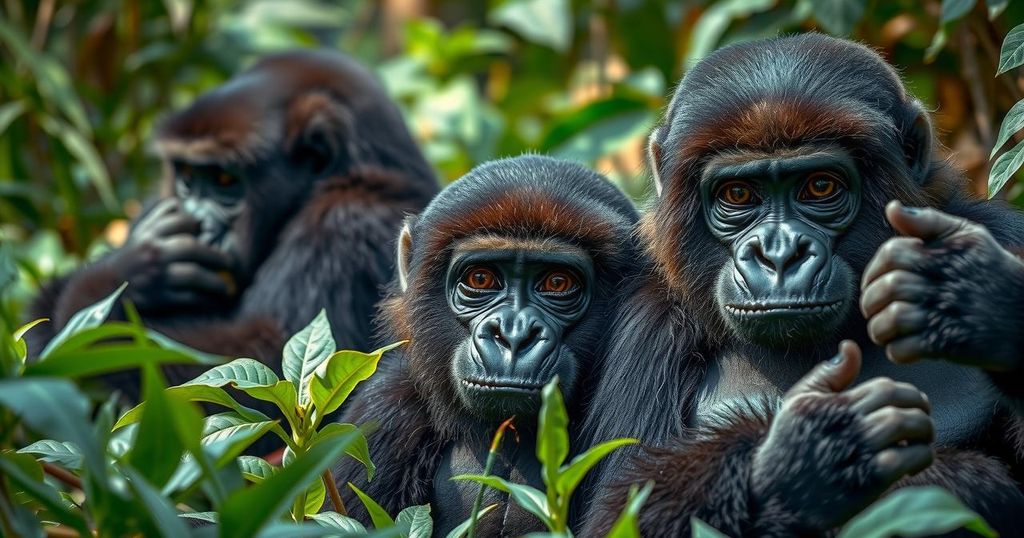Gorilla Population Growth Amidst Global Wildlife Decline: Insights from the WWF 2024 Report
The WWF 2024 Living Planet Report indicates a 3% annual increase in the mountain gorilla population since 2010 in the Virunga region, contrasted by a global wildlife decline of 73% over 50 years. The report emphasizes the need for continued conservation efforts amidst alarming trends affecting global ecosystems, particularly in freshwater habitats.
According to the World Wildlife Fund (WWF) 2024 Living Planet Report, the population of mountain gorillas has been experiencing a notable annual growth rate of 3% since 2010 in the Virunga region, which encompasses the Democratic Republic of Congo (DRC), Uganda, and Rwanda. Notably, within Uganda’s Bwindi Impenetrable Forest National Park and the neighboring Sarambwe Reserve in the DRC, there are approximately 459 individual gorillas documented. However, while the mountain gorilla population shows positive growth due to conservation efforts—including effective management of protected areas and community engagement—the report indicates a more troubling decline in the average size of monitored wildlife populations globally, down by 73% over the last 50 years. This stark statistic underscores the broader challenges posed by the intertwined crises of climate change and biodiversity loss, threatening not only wildlife but also the integrity of ecosystems crucial for human survival. The WWF report elucidates the importance of wildlife population trends as indicators of the health of ecosystems, which provide essential resources such as food, clean water, and air quality. It stresses that damage to these systems may lead to significant disruptions, pushing ecosystems toward critical tipping points, particularly in globally significant areas like the Amazon. Kirsten Schuijt, the Director General of WWF International, expressed concern over these findings, stating, “It is no exaggeration to say that what happens in the next five years will determine the future of life on Earth.” Furthermore, during a keynote address, Dr. Maggie Kigozi emphasized the urgency of collective action, questioning, “Our challenge is that. How do we wake up everybody?” The report further highlights that various ecosystems are exhibiting contrasting trends; while marine species, such as fish, show slightly less decline due to management strategies, freshwater habitats suffer greatly, with an 85% decline noted, primarily due to habitat degradation and unsustainable practices like agriculture and development. The report ultimately stresses the imperative for unified action at local, national, and global levels to mitigate these issues before it is too late.
The significance of mountain gorilla conservation has been underscored by the steady increase in their population, attributed to dedicated conservation efforts in eastern Africa. However, the overall trend for wildlife globally has been concerning, showcasing the dire state of many species and ecosystems that have been adversely affected by human activities and environmental change. The Living Planet Report serves as a critical assessment of these trends, calling attention to the urgent need for conservation and sustainable practices.
The WWF 2024 Living Planet Report offers a dual perspective on conservation achievements and alarming global wildlife declines. While the mountain gorilla population sees a promising annual growth rate due to targeted conservation strategies, the broader scenario reveals a severe decrease in wildlife populations globally. This highlights the need for increased efforts in conservation to preserve essential ecosystems that support both wildlife and human needs. Immediate action is crucial as the coming years will determine the trajectory for biodiversity and the health of our planet.
Original Source: chimpreports.com




Post Comment